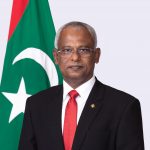Politics
Maldives Politics
This page explores Maldives’s political structure incorporating real-time RSS feed news and videos. By harnessing the power of RSS feeds, visitors can stay informed about the latest developments in Maldives’s politics as they happen. The dynamic nature of these feeds ensures that users receive up-to-the-minute updates on political events, policy changes, and significant milestones, enabling them to stay abreast of the ever-evolving political scene.

Ibrahim Mohamed Solih
President of the Maldives
Incumbent
Assumed office
17 November 2018
Image credit
The Maldives operates as a presidential republic, with a political structure that combines democratic governance with a centralized system of power. The political landscape of the Maldives is shaped by a strong presidency and a multi-party system.
At the top of the political structure is the President of the Maldives, who serves as the head of state and government. The President is elected by popular vote for a five-year term and holds significant executive powers. The President appoints the cabinet members who assist in the administration of the country.
The legislative branch in the Maldives is represented by the People’s Majlis, which is a unicameral parliament. Members of the People’s Majlis, known as MPs, are elected through a first-past-the-post system. The People’s Majlis is responsible for enacting laws, approving the national budget, and providing oversight of the executive branch.
The judiciary in the Maldives operates independently and ensures the interpretation and application of the law. The highest judicial authority is the Supreme Court, which serves as the final appellate court and has the power of judicial review. The judiciary also includes lower courts that handle various legal matters.
Political parties in the Maldives play a significant role in the political landscape, with elections being an important aspect of the democratic process. However, it is worth noting that political dynamics in the Maldives have experienced fluctuations, including periods of political unrest and challenges to democratic institutions.
In conclusion, the Maldives’ political structure is characterized by a presidential republic, with a strong presidency and a multi-party system. The President holds executive authority, while the People’s Majlis enacts laws and provides oversight. The judiciary operates independently to uphold the rule of law. The political system of the Maldives aims to promote democratic governance, protect individual rights, and address socio-economic challenges.
Unless other sources are listed, original content is provided by ChatGPT. ChatGPT may produce inaccurate information about people, places, or facts.



